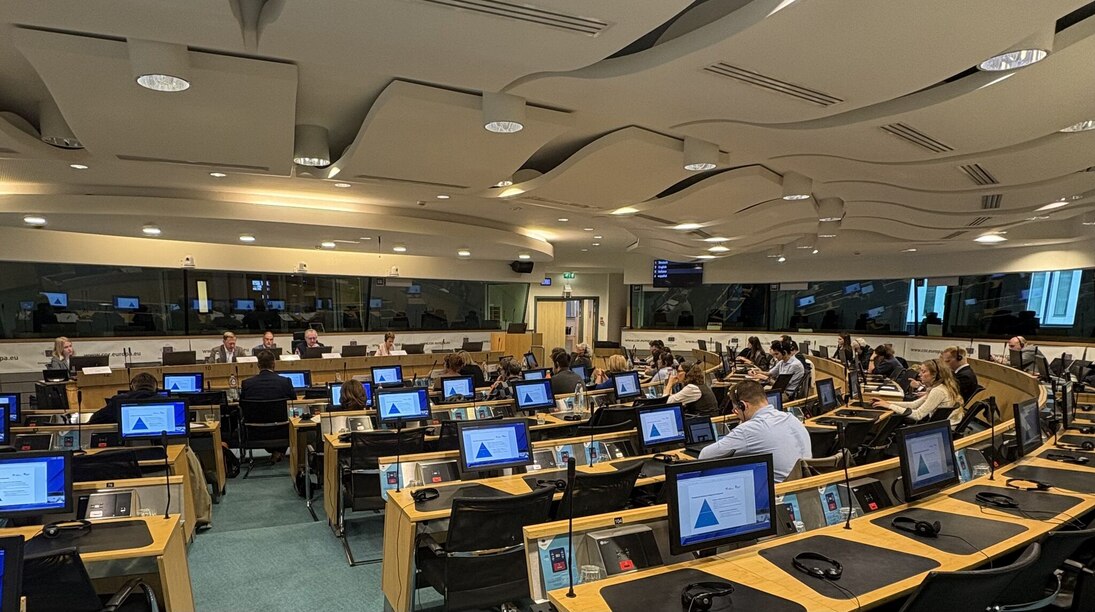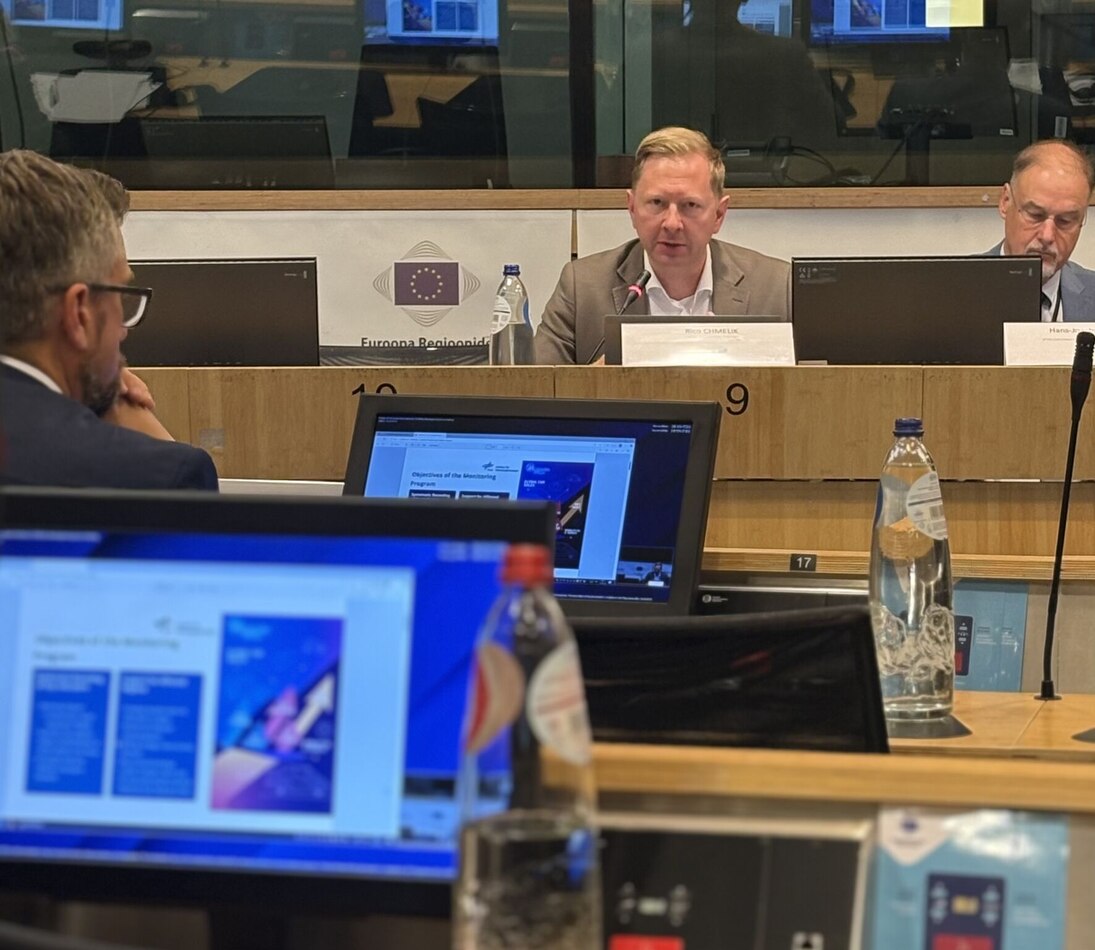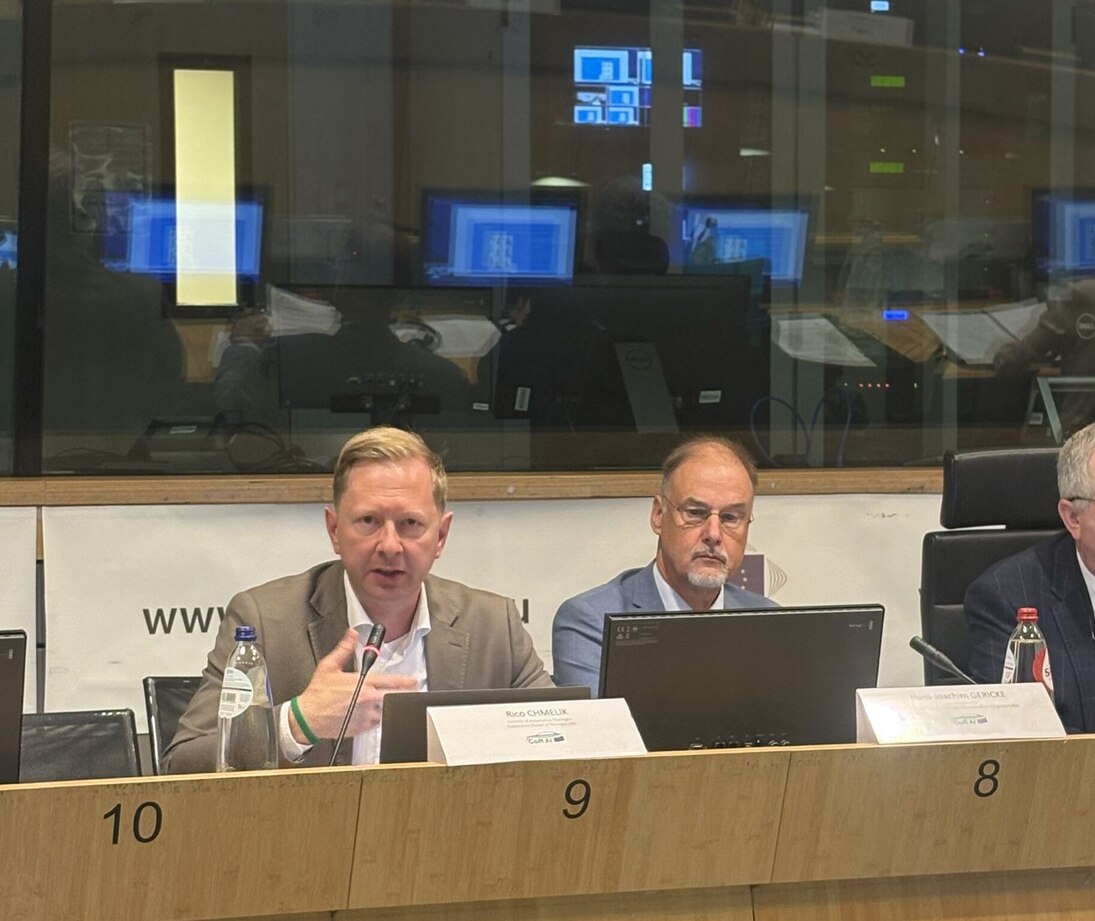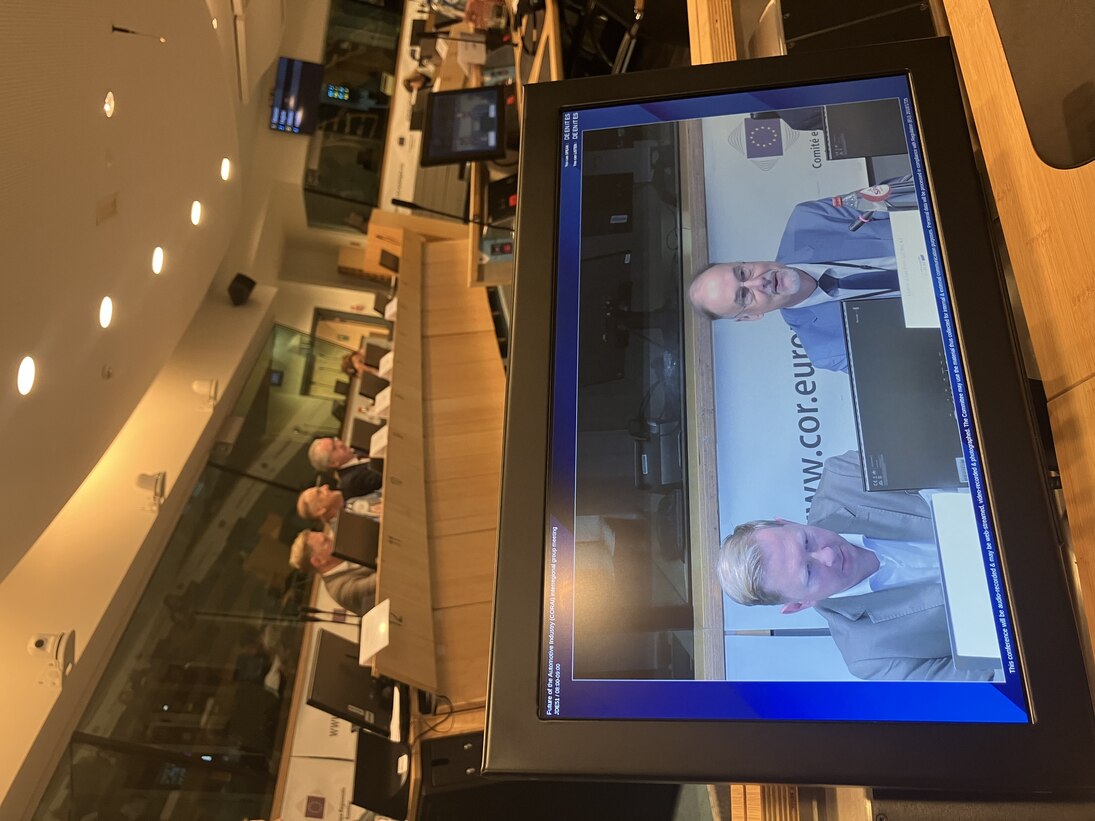CoRAI Meeting 15-05-2025
CoRAI Meeting 15-05-2025: Setting course in crucial times for Europe's automotive regions
On 15 May 2025, the members of the Interregional Group on the Future of the Automotive Industry (CoRAI) met at the European Committee of the Regions for their first meeting in the 8th CoR mandate.
Opening and introduction of new CoRAI members
Chairman Thomas Schmidt welcomed the members and participants. He announced that the CoR's Automotive Intergroup was renewed by decision of the CoR Bureau on 1 April 2025.
Furthermore, he was delighted to welcome new CoRAI members:
- María Isabel Blanco Llamas (ES/EPP)
- Martin Dulig (DE/PES)
- Isolde Ries (DE/PES)
- Jaume Duch Guillot (ES/PES)
He thanked them for their commitment and gave them a warm welcome.
Announcements by the Chairman
The Chairman pointed out that the European automotive sector is at a critical turning point and is facing rapid technological change and increasing competition. The new mandate period begins with an important turning point: the Industrial Action Plan for the European Automotive Sector, which was presented by the Commission on 5 March 2025.
The new mandate period begins with an important turning point: the Industrial Action Plan for the European Automotive Sector, which was presented by the Commission on 5 March 2025. It is of key interest for CoRAI to enter into dialogue with the EU Commission and contribute the regional perspective to the transformation processes.
A second turning point in the current term of office is the postponement of fines for the automotive industry. This gives the industry room for manoeuvre for further development, which CoRAI should also help to shape constructively.
The industry clearly states that electrification for passenger cars is the best and most efficient way to achieve the climate targets. This is the future of the automotive industry and also the future for an automotive business model in the EU and in our regions.
The Chairman emphasised that we must remain technologically open - both with regard to e-fuels and biofuels, as well as completely new technologies that we may not even know about today. He explained how important it is to remain reliable with political recommendations and cited the socalled ‘Masterplan Südwestsachsen’ for structural development in southwest Saxony as an example for future-oriented strategies.
Key demands of CoRAI
The Chairman makes a proposal as to what CoRAI should demand in the near future. The positions are in line with those of the Automotive Regions Alliance (ARA). He expected the ARA to include the CoRAI in its activities. The Grand-Est region, the ECR and the state of Saxony-Anhalt helped to form an opinion.
The Chairman would like to thank them for this. The Grand Est region contributed two initiatives relevant to the automotive sector in the run-up to the meeting:
- The ‘Engagement and Development of Employment and Skills’ (EDEC) programme. This programme focuses on the needs of automotive companies and their employees. It offers these companies support and training for employees to close skills gaps. A report analysing the changing workforce needs will be presented at the ARA conference in Strasbourg in June.
- The ‘Decarbonised Mobility Grand Est’ programme, which supports the transformation of the automotive sector. Technical workshops will be organised on various topics (diversification strategies, skills development, market analysis, exchange of best practices with automotive clusters and other companies, etc.). The programme is supported by the region and the regional chamber of commerce.
The Chairman explained that CoRAI should advocate greater consideration of the regional dimension. This could increase the effectiveness of the EU Commission's action plan.
He therefore proposes the following measures:
- To ensure the regional perspective in the implementation of the action plan, the EU Commission is calling for the establishment of an ‘implementation dialogue’ with the automotive regions, in which CoRAI and ARA should be involved. The implementation dialogue should be based on a platform that offers regional players the opportunity to exchange best practices with each other, with the Commission and with associations and companies. The JTF platform could serve as a model. 3
- The EU Commission is called upon to draw up a sound impact assessment as a starting point for political measures at regional, member state and European level to enable targeted structural development.
- The transformation of the regions must be considered beyond the automotive industry: regional resilience, new employment and economic prosperity can only be achieved through new value chains in the existing automotive regions.
- CoRAI calls for support for the training and reskilling of workers who are to be deployed in new sectors.
- It is important to support and promote regional automotive clusters, which enable shorter and more resilient value chains, as emphasised in the OECD report ‘The Future of the Automotive Value Chain’.
- The EU Commission is being asked to examine the establishment of special economic zones with specific criteria in order to create tax incentives for investments in the automotive regions for a limited period of time or to define other benefits. This will lead to a low-bureaucracy investment promotion and support the transformation process very quickly and efficiently.
The Chairman emphasised that CoRAI, as the representative of Europe's automotive regions, must raise its voice and will therefore send these demands to the Commission. He asked for requests to speak if there were any additions, comments or further suggestions. The current situation requires clarity, which must be established within CoRAI and the other automotive alliances.
The Chairman explained: ‘If we cannot agree on important basic concerns and objectives, we will not be able to stand up to the new Commission.’ Clear expectations for the transformation of the automotive and other industrial sectors were expressed during the discussion.
To summarise, these include:
- Close coordination with the regions in all strategic planning
- Sound assessment of the economic impact
- Diversification of the economy as a key measure for resilience
- Strengthening education and training to secure skilled labour for new technologies
Presentation of the «Just Transition Monitoring Program”
by Rico Chmelik (Director of Automotive Thüringen, Automotive Cluster of Thuringia (DE)).
Contributions from CoRAI members
CoRAI Vice Chair María Victoria Chivite Navascués (ES/PES) identified three points for further development:
- The period until 2035 for the transformation must be adhered to. There is no plan B.
- The European response to global challenges must not be a trade war, but rather the industry must be made competitive through innovation and public funding. To achieve this, the entire value chain must be considered and synergy effects utilised. Further training and education are key success factors.
- The Commission's Automotive action plan must be made more agile. Far-reaching visions are needed, which must be realised through concrete measures and financial support. CoRAI should advocate more intensively for the automotive industry as a pillar of the European economy.
Ms Chivite backed up her presentation with examples from Navarra on the registration of 4 electric vehicles, tax benefits, purchase premiums, savings through longer use and training and further education initiatives.
María Isabel Blanco Llamas (ES/EPP) emphasised:
- Competitiveness and adaptability must be strengthened. Change must be harmonised with the real and social world. Flexible solutions must be designed for this.
- In Castile and Léon, the automotive industry accounts for 20% of economic output. Long-term EU strategies for autonomous driving, AI, etc. are therefore necessary.
- In the trade war, the EU's trade defence instruments must be strengthened.
- It is important to reduce bureaucracy.
Marco Marsilio (IT/ECR) added:
- That he supports the plans and comments presented by Chairman Thomas Schmidt.
- He would have welcomed it if the fleet limits for CO2 emissions had been postponed to three years (instead of the current two years).
- Against the background of the hesitant introduction of electromobility, he calls for technology neutrality for further developments.
Isolde Ries (DE/PES) expressed the following views:
- There should be no penalties for the automotive industry if they do not meet the 2035 target.
- However, the 2035 target must remain as a guideline to give companies planning security.
- Tax benefits should also apply to infrastructure measures (e.g. charging infrastructure).
- She takes a critical view of special economic zones.
Martin Dulig (DE/PES) stressed:
- The focus must be on competitiveness and speed.
- A crisis of confidence is caused by political uncertainties.
- He also expressed scepticism towards special economic zones and called for a clear definition of what is specifically associated with them.
- The infrastructure for modern mobility is crucial - investments in roads and new technologies are necessary, including advanced sensor technology.
Closing of Meeting
The Chairman thanked everyone for the presentation and for their contributions and the associated support for the CoRAI positions.
Setting course in crucial times for Europe's automotive regions
CoRAI Meeting Thursday, 15 May 2025, 08.00 – 09.00 a.m.
European Committee of the Regions, JDE 51
Language interpretation: English, German, Italian, Spanish
1. Opening remarks by the chairman
Thomas SCHMIDT, DE/EPP
President of the Committee of the Regions Automotive Intergroup CoRAI
Head of the German Delegation to the European Committee of the Regions
2. Expert keynote speaker on the Just Transition Monitoring Program
Rico CHMELIK
Director of Automotive Thüringen (Automotive Cluster of Thuringia (DE))
3. Intervention
by María Victoria CHIVITE NAVASCUÉS, ES/PES
Co-Chair of the Committee of the Regions Automotive Intergroup CoRAI
President of the Regional Government of Navarre, Spain
4. Information and discussion on CoRAI in the 8th CoR mandate
5. Closing remarks by the chairman



_rdax_1095x821_87.jpeg)

